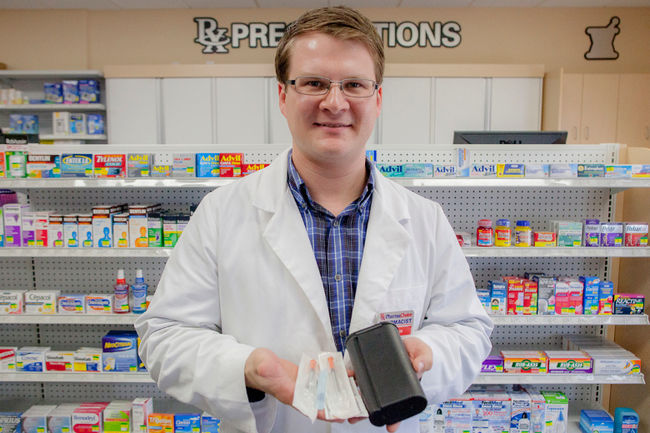
Trevor Bills the pharmacy manager at Life Med Pharmacy in Whitecourt, Alta. on Friday, Oct. 3, 2014. (photo: Whitecourt Star)
Whitecourt is part of a collection of rural towns and municipalities included in the rollout of the province’s first rural-based harm reduction program.
Sarah McNicoll, client support and outreach for Edson, Hinton, Whitecourt and area with HIV West Yellowhead, said there is a need in the region for a harm reduction program targeted at people who use injection drugs.
The program seeks to curb the health-risks associated with injection drug use by providing safer injection kits.
“The kits have a needle, a tie-off, a little cooker and a packet of sterilized water. The reality is that someone who has an addiction won’t quit until they decide to,” said McNicoll. “By providing these kits we can at least ensure that they’re being safer about it and perhaps can help reduce the spread of viruses like HIV or Repetitious C.”
Life Med Pharmacy in Whitecourt has agreed to be a distributer of these kits on behalf of HIV West Yellowhead for those who need them in Whitecourt.
While all drug abuse carries with it personal and community health risks, McNicoll said that injection drug use carries the added risk of contracting a blood-borne illness. The two chief ones that HIV West Yellowhead is concerned with is HIV, the virus that causes AIDS and Hepatitis C.
Trevor Bills, pharmacy manager at Life Med Pharmacy, said that he agreed to participate in the harm reduction program because he said it is a valuable part of promoting community health.
“The behaviours we want to curb are the reuse and sharing of needles but we also want to encourage proper disposal. That’s why these kits come with a sharps disposal box, they can also return them here,” said Bills. “It’s an important part of ensuring health and safety in our communities not only for those requiring the services but for the community at large.”
McNicoll said they decided to build the program after finding a need in the region.
“We conducted a needs assessment study with help from the University of Alberta in the region,” said McNicoll. “What we found was that rural areas face the same challenges that cities do regarding injection drug use.”
She said that in rural communities people who use injection drugs may not be as visibly confined to a single area, as they might be in a city.
“The biggest issue is privacy,” said McNicoll. “Many of these communities are small and our clients are concerned about being stigmatized in the community.”
Right now McNicoll works out of her home in Edson. She said when a client calls she’ll arrange a spot to meet them and typically give them as many kits as she can spare.
“Because the community is somewhat isolated, the best way to get supplies to them is through peer-distribution,” said McNicoll.
This pilot phase though is just a stopgap measure.
Andrea Watson, executive director of HIV West Yellowhead said that ultimately their goal is to be able to provide harm reduction supplies through local pharmacies.
“Pharmaceutical distribution is considered best practice in harm reduction right now,” said Watson. “In B.C. secondary distribution through the pharmacies is done province-wide.”
She said the combination of accessibility and discretion offered by pharmaceutical distribution means that more clients are likely to receive supplies.
“Right now we aren’t able to track how many of our clients are receiving these supplies precisely,” said Watson. “We know that last year we handed out more than 23,000 needles but we don’t know for sure how many people were provided with needles. With distribution through pharmacies we would be able to track how many people are accessing those.”
Watson said the program is still in its infancy. The goal now, she said, is to establish stronger connections and networks with the community of those who use injection drugs and to get more local pharmacies on board with distribution.
Source: Whitecourt Star
